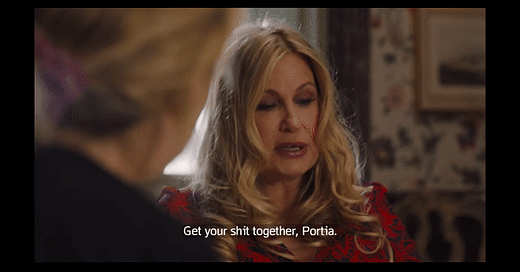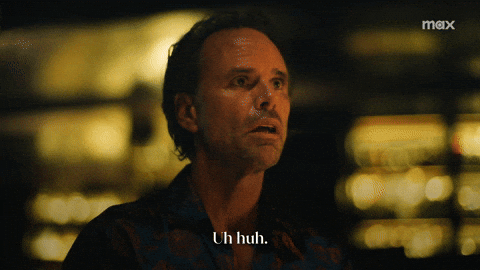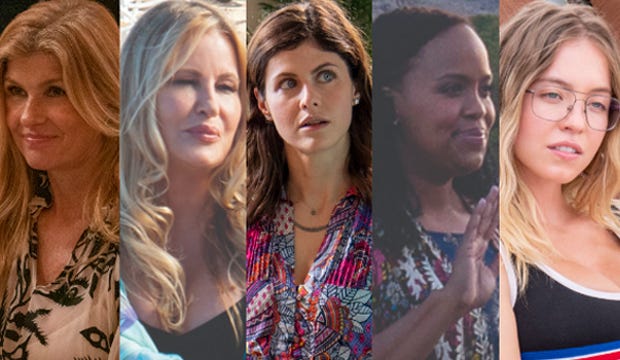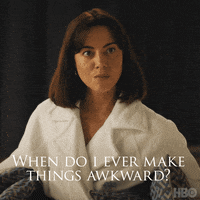Why does everyone love The White Lotus?
Show me what people (watch) and I'll tell you how they see the world.
"These gays, they’re trying to murder me!"
Tanya McQuoid (Jennifer Coolridge), dashing across the deck of a yacht in the beautiful waters of Sicily, shrieks her now iconic line during the second season of The White Lotus. It’s absurd, but also deeply tragic, which represents what the show is about.
The White Lotus is managing to dominate public discourse, proving that long-form storytelling can still command attention in the age of algorithm-driven content. Their success is no accident, like all good art, they tap into something deeply relevant about the world we live in today and make people reflect, between laughs (maybe cries).
This article will break down why The White Lotus isn’t just great TV, but how it reveals as much about the viewer, as the characters on the show.
But first, make sure to hit the Subscribe button below to join the nearly 1,000 Subscribers that get articles like these, delivered directly to their inbox.
If this week’s article does not interest you, please check out some other recent ones:
The Premise: Luxury, Entitlement, and Chaos
“What do you think is gonna happen? You’re gonna travel the world and suddenly, like, gain some perspective?” Olivia Mossbacher (Sydney Sweeny) —White Lotus Season 1
The White Lotus is named after a fictional luxury hotel chain with locations around the world. The premise is simple: each season takes place at a different resort, following a new cast of ultra-high-net-worth (UHNW) guests and the hotel staff who serve them. The dynamic remains the same: entitled, high-maintenance guests indulge in an extravagant vacation while finding endless reasons to be dissatisfied with the hotel, their travel companions, locals or themselves.
The show masterfully parodies the concept of first-world problems. The characters are so rich that basic survival is not a concern. Their problems are, for the most part, unrelatable to the average viewer. The White Lotus creator, Mike White, masterfully exaggerates their grievances, highlighting their detachment from real-world struggles. They can’t sit back, relax and enjoy their vacation, because any inconvenience or perceived injustice is an assault on their sense of self. They can't let that stand.
This alone isn’t what makes the show good. There’s too much content out there making commentary on rich people being bad. What keeps fans hooked is the intoxicating blend of exotic locations (Hawaii, Sicily, & Thailand aka Taiwan), hypnotic music, a bombshell cast, and a dark undercurrent exposing the complex moral decay of society, extending beyond the ultra-wealthy.
Giving The People What they Want
The subtlety is key, because for a film/tv series to go truly mainstream, they have to avoid alienating large parts of their audience. If The White Lotus went overboard, it would descend to anti-rich people propaganda, that only appeals to people looking for that sort of thing. It’s not impossible to have success by catering to a niche group, but it will be hard to reach the same cultural relevance if most of the population feels like the show isn’t for them. You can’t accuse The Sopranos, Breaking Bad or Game of Thrones of trying to repel certain audience types. Well perhaps, some vegans were triggered by all those deli meats and prosciutto sandwiches (sorry!).
Most people aren’t looking for explicit political declarations when watching premium television. The White Lotus is a good show because it threads the needle of bringing up charged topics without bludgeoning viewers with their own ideology. This allows for various viewing motivations. For those that want to see beautiful rich people making funny quips in exotic locations, great. If you want a more intelligent show, you can get lost in the thrill of a murder mystery with overly self important nouveau riche people. Regardless of who you are sitting with everyone can find a way to enjoy the show. Anyone can find a character to root for, regardless of their beliefs.
This is because of the subtle Rorschach test embedded into the writing.
The Rorschach test, (also known as the inkblot test) is a psychological test where individuals describe what they see in a series of inkblots. Their responses are analyzed to assess personality, emotional functioning, and potentially screen for certain mental conditions. It exemplifies how people can come up with many different interpretations despite seeing the same image.
The White Lotus, is a rare example of a show that can address charged topics without alienating potential audiences. During this era of hyper polarization, it’s increasingly rare. The clever writing permits people to watch whatever show they want to see. If certain viewers are looking for a show depicting out of touch rich people, they have plenty examples of this. If others want a show depicting the irony of people whining about injustice while staying in a $10,000 per night resort, this is served to them as well. Regardless of your politics or bias, The White Lotus is here to welcome you.
A perfect example of this was on display during the first season, when Nicole Mossbacher (Connie Britton), a successful CEO of a big tech company, shared her views on diversity equity inclusion (DEI). As a female in an industry overrepresented by men, many would expect her to be supportive of such measures but she wasn’t. During a dinner discussion, she says DEI makes it impossible to hire young straight white men, therefore they are the ones that deserve sympathy. Naturally her college aged daughter Olivia and her friend Paula, disagreed, thinking she was out of touch. This depicts a conflict between different generations of women, that can have conflicting views of what equality means.
Some younger women feel the more senior women at their firms are not doing enough to support their growth; that they see other women as competition instead of allies. Nicole would represent this perspective. She exhibits this behavior when Rachel Patton (Alexandra Daddario) tells Nicole that she was an inspiration. Nicole at first seems touched, then quickly turns sour then accuses Rachel of writing an unflattering article about her, implying she didn’t deserve her position. This scene demonstrates the clash between the second and third generation feminist movements, the tension around DEI and other topics in a nuanced but not cringe or over the top way. This brings thoughtful discussion to the topic without making the audience feel bludgeoned politically.
This is done by acknowledging different perspectives, thus performing the Rorschach test. Those that agree with Nicole’s point of view, can dismiss Olivia and Paula’s perspectives as self interested or the ignorance associated with their lack of life experience. Those sympathetic to Olivia and Paula, can equally dismiss Nicole as being old and out of touch, or that this confirms their view on women whom view other women as competition. The same scene can be shown to a diverse range of views but they will come away believing that Mike White shared their perspective.
To left leaning fans of the show, The White Lotus is a satire of the moral decay of the wealthy. It reinforces their belief that we need to eat the rich. To those on the opposite end of the spectrum, it shows how out of touch global elites are, and why these aren’t the people we should trust to run our institutions. The White Lotus can pull off this delicate balance because of great writing, and terrific acting.
Casting Brilliance
The White Lotus team has mastered the art of casting. They are great at selecting actors that perfectly embody charcutiers of people we know or can imagine knowing in real life. Since The White Lotus is a dramedy (Drama-Comedy), which is an added difficulty for the actors to balance. If they are too realistic, we will simply detest their characters and the show won’t be funny. If they aren’t authentic enough, it feels more like a sitcom, lacking any real stakes or tension.
Take Tanya McQuoid. If she was played by anyone other than Jennifer Coolridge, we probably would have hated her; which would have a significant impact on our enjoyment of the show. Her silly exclamations and one liners make her impossible not to love, even if she occasionally does objectively bad things. Portrayed differently, Tanya can easily come off looking as a villain.
Great art can challenge us and enhance our understanding of the world. When we are confronted with characters we are meant to dislike, but find ourselves loving, we should reconsider our beliefs. Many from the woke crowd will hate on rich people all day but the second Jennifer Coolridge comes on, they can’t help but laugh and smile. They won’t admit this, but maybe they don’t hate the rich as much as they claim.
What is equally impressive and adds to the difficulty, is that the cast and location change every season, effectively depriving the audience of the emotional connection they forged with the previous characters. Few shows have been able to successfully pull this off. True Detective season one with Matthew McConaughey and Woody Harrelson, was among the best seasons of television ever. Unfortunately the show runners could not repeat this success in subsequent seasons.
The fact that The White Lotus has managed to do this for multiple seasons now, puts them in unchartered territories. They have done good job of mixing in new personalities such as the Spillers (Audrey Plaza & Will Sharpe) in season 2 or Chelsea (Aimee Lou Wood) in season 3 while also trying new takes on similar characters such as with Cameron Sullivan (Theo James) and Saxon Ratliff (Patrick Schwarzenegger). Although the basic format can get stale very fast, these great characters quickly win viewers over, making us forget about previous seasons.
So Why Does Everyone Love The White Lotus?
Most people think of The White Lotus as a show that skewers the excesses of the ultra-wealthy, but the reason it’s so enjoyed, is because viewers can see the show they want based on their own biases and sympathies. The White Lotus is a dramedy, but the extent it’s a drama or a comedy, depends how you view the world.
Each characters has plenty to like or hate, so what Mike White has done, has given each of us a canvas to build our own adventure around. This stands in stark contrast to many contemporary shows that attempt to take a clear stance on morality, but fail to sway anyone or make a watchable show. The White Lotus thrives in the murky in-between in its gorgeous settings while beautiful people, do ugly things.
As we approach the Season 3 finale, the question isn’t whether Mike White and his team will deliver but what we’ll see in the inkblot of its story. The more we watch, the more we learn about ourselves. And if there’s one thing people are truly obsessed with, it’s themselves, which is why everyone loves The White Lotus.
Is this why you love The White Lotus? Please let me know in the Comments and don’t forget to Subscribe.













I watched the episode Sunday and was haunted by it. But...I. couldn't figure out why. Until I did. I wrote it all up and would love to know what you think... https://substack.com/home/post/p-160301391